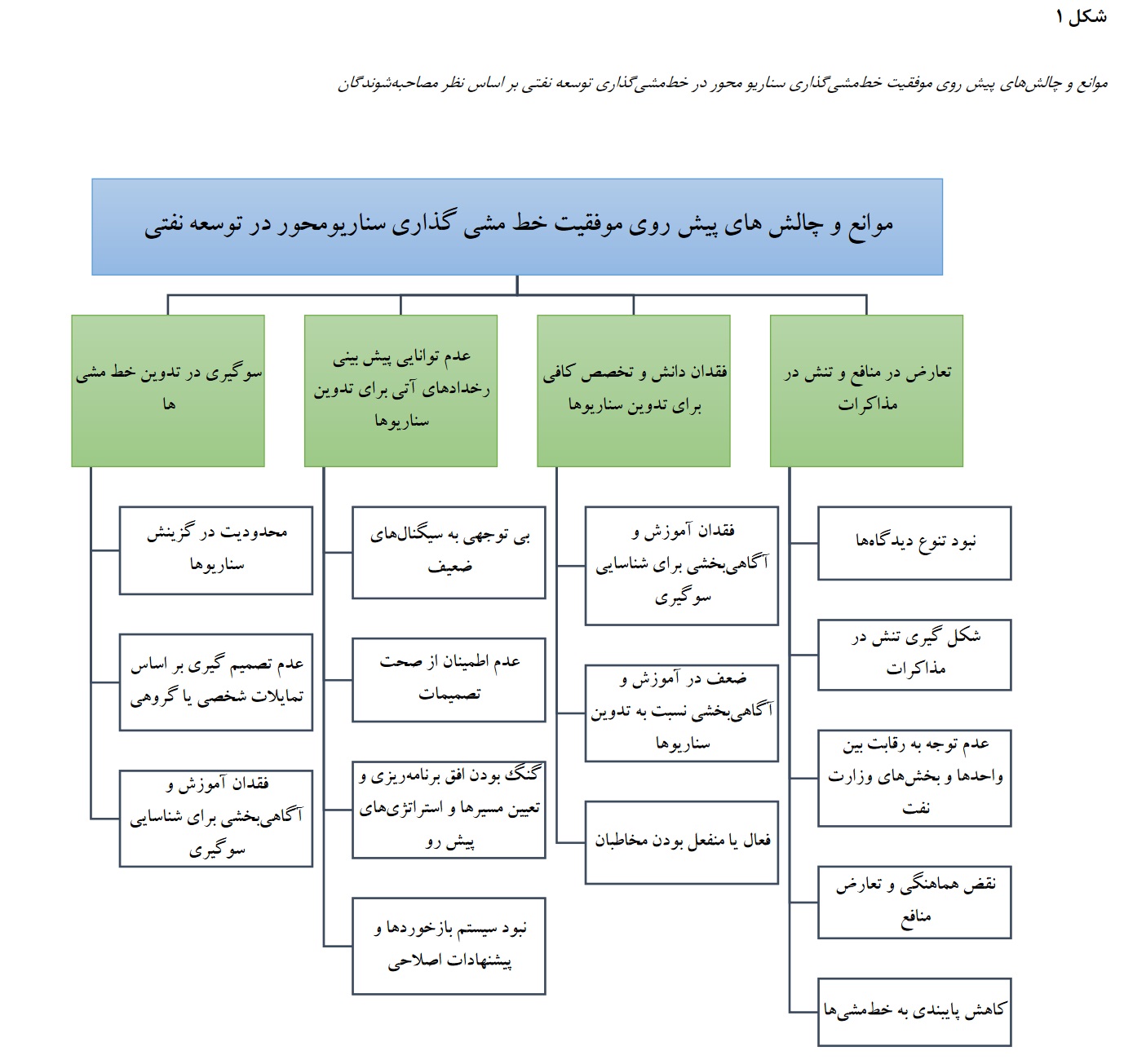موانع و چالشهای پیش روی خط مشی گذاری سناریو محور در خط مشی گذاری توسعه نفتی
کلمات کلیدی:
سیاستگذاری مبتنی بر سناریو, توسعه نفتی, سوگیری, پیشبینی رخدادهای آتی, دانش و تخصصچکیده
هدف از این پژوهش شناسایی و تحلیل موانع و چالشهای پیش روی سیاستگذاری مبتنی بر سناریو در زمینه سیاستهای توسعه نفتی ایران است. این مطالعه به بررسی منابع بایاس، قابلیت پیشبینی رخدادهای آتی، سطح دانش و تخصص موجود برای تدوین سناریوها، و تعارضات منافع و تنشهای موجود در مذاکرات میپردازد. این پژوهش به روش کیفی انجام شد و از مصاحبههای نیمهساختارمند و تکنیک دلفی برای جمعآوری دادهها استفاده شد. در ابتدا، پرسشنامههای دلفی بین 20 نفر از مدیران ارشد وزارت نفت و خبرگان دانشگاهی توزیع گردید. دادهها از طریق مصاحبههای نیمهساختارمند جمعآوری و با استفاده از نرمافزار NVivo تحلیل شدند. تکنیک دلفی در سه مرحله اجرا شد تا به اشباع نظری دست یابد. یافتههای این پژوهش نشان داد که چهار مفهوم اصلی به عنوان موانع و چالشهای سیاستگذاری مبتنی بر سناریو در توسعه نفتی ایران شناسایی شدند: سوگیری در تدوین خطمشیها، عدم توانایی پیشبینی رخدادهای آتی، فقدان دانش و تخصص کافی برای تدوین سناریوها، و تعارض در منافع و تنش در مذاکرات. این چالشها میتوانند منجر به کاهش کیفیت و اثربخشی سیاستها شوند. نتایج نشان میدهد که شناسایی و مدیریت سوگیریها، بهبود تواناییهای پیشبینی، افزایش دانش و تخصص در تدوین سناریوها، و مدیریت تعارضات منافع و تنشها میتواند به بهبود فرآیند سیاستگذاری مبتنی بر سناریو کمک کند. برنامههای آموزشی و آگاهیبخشی، ایجاد سیستمهای بازخورد و تحلیلهای پیشبینی میتوانند در این راستا مؤثر باشند.
دانلودها
مراجع
Aier, S. (2014). The role of organizational culture for grounding, management, guidance and effectiveness of enterprise
architecture principles. Information Systems and e-Business Management, 12(1), 43-70.
https://doi.org/10.1007/s10257-012-0206-8
Aier, S., & Saat, J. (2011). Understanding processes for model-based enterprise transformation planning. International
Journal of Internet and Enterprise Management, 7(1), 84-103. https://doi.org/10.1504/IJIEM.2011.038384
Alibeygi, J., Jalalian, H., Azizpour, F., & Mahdizadeh, H. (2018). Preparing the map of main drivers for the strategic
future study of the effects of the implementation of the Arid Areas Project on Mehran and Godarkhosh plains in line
with planning management. Strategic Management Researches, 70(24), 145-167.
http://sanad.iau.ir/fa/Article/1095453
Armstrong, M., & Taylor, S. (2006). Human resource management practice. Distributed Computing (10th ed.).
https://doi. org/10.1002/9781118802717.
https://www.academia.edu/download/60118458/Armstrong_s_Essential_Human_Resource_Man20190725-
-ex0g7s.pdf
Asemannasab, B., & ghadami, m. (2021). Knowledge Management in the future. Journal of Strategic Management
Studies, 12(46), 221-235. https://www.smsjournal.ir/article_113099_b28b0f7c6b9d5155afbdaf4f513dc4fd.pdf
Boudreau, J. W., & Ramstad, P. M. (2005). Talentship, talent segmentation, and sustainability: A new HR decision
science paradigm for a new strategy definition. Human Resource Management, 44(2), 129-136.
https://doi.org/10.1002/hrm.20054
Faeni, D. P., Puspitaningtyas Faeni, R., Alden Riyadh, H., & Yuliansyah, Y. (2023). The COVID-19 pandemic impact
on the global tourism industry SMEs: a human capital development perspective. Review of International Business
and Strategy, 33(2), 317-327. https://doi.org/10.1108/RIBS-08-2021-0116
Hafez, H. M., & Attia, Y. A. (2020). Challenges to the poultry industry: Current perspectives and strategic future after
the COVID-19 outbreak. Frontiers in veterinary science, 7, 516.
Hamadamin, H. H., & Atan, T. (2019). The Impact of Strategic Human Resource Management Practices on Competitive
Advantage Sustainability: The Mediation of Human Capital Development and Employee Commitment.
Sustainability, 11(20).
Hamidi, A., Faghihi, A., & Teimoornezhad, K. (2024). Identifying and Ranking Factors Affecting Policymaking of Public
Administrators' Education. Public Management Researches, 16(62), 63-96.
https://doi.org/10.22111/jmr.2022.42740.5807
Jafarpour Marzouni, Z., Khorsandi Taskoh, A., & Abdollahinejad, A. (2022). The skills and effective factors on
improvement of university educational departments performance in the network community. Quarterly Journal of
Research and Planning in Higher Education, 28(3), 1-23. https://doi.org/10.52547/irphe.28.3.1
Kurniadi, D. (2024). Influence of Human Capital, Emotional Intelligence and Self Efficacy to Employee Performance
Moderated by Organizational Citizenship Behavior (Ocb) in Politeknik Pelayaran Malahayati Aceh. Kuey.
https://doi.org/10.53555/kuey.v30i5.2477
Mehmood, K. K., & Hanaysha, J. R. (2022). Impact of Corporate Social Responsibility, Green Intellectual Capital, and
Green Innovation on Competitive Advantage. International Journal of Human Capital and Information Technology
Professionals. https://doi.org/10.4018/ijhcitp.293232
Nie, X. (2024). Human Capital impact on productivity in Chinese enterprises: analyzing the mediating role of innovation.
https://doi.org/10.21203/rs.3.rs-4016817/v1
Nonahal Nahr, A. A., & Rahnama Roodposhti, F. (2018). Contingent Performance Assessment Measures Design Based
on Futurology: A Theoretical Approach. Journal of Future Studies Management, 29(1), 67-91.
https://www.magiran.com/paper/1844295
Rezaei Mirghaed, A., Seyed Naghavi, M., Dehghana, H., & Amiri, M. (2017). Investigating and determining the human
resources productivity functions based on the architecture of human resources model. The Journal of Productivity
Management, 1(11), 185-220. http://sanad.iau.ir/fa/Article/976268
Rezazadeh, M., Hosseinzadeh, B., & hosseini daroon kalaie, z. (2023). The Designing a Model of Effect of ResearchBased Teaching Management on Metacognition Management with Mediating Role of Organizational Climate (Case
Study: Mazandaran Education Department). Sociology of Education, 9(1), 215-230.
https://doi.org/10.22034/ijes.2023.560574.1345
Roos, G., & Pike, S. (2018). Intellectual capital as a management tool: essentials for leaders and managers. Routledge.
Roos, G., & Roos, J. (1997). Measuring your company's intellectual performance. Long Range Planning, 30(3), 413-426.
https://doi.org/10.1016/S0024-6301(97)90260-0
Salman Al-Oda, A. H., Sadeghi, M., Al-Murshidi, R. H. A., & Sharifi, S. (2024). Investigating the Relationship Between
Talent Management Implementation Categories in the Basra Province Education Organization [Research Article].
Iranian Journal of Educational Sociology, 7(1), 1-9. https://doi.org/10.61838/kman.ijes.7.1.1
Samadzad, S., & Hashemi, M. (2022). Human Capital Externalities and Productivity in Cities. International Journal of
Innovation in Management, Economics and Social Sciences, 2(4), 20-32. https://doi.org/10.52547/ijimes.2.4.20
Torres, A. I., Ferraz, S. S., & Santos-Rodrigues, H. (2018). The impact of knowledge management factors in
organizational sustainable competitive advantage. Journal of Intellectual Capital, 19(2), 453-472.
https://doi.org/10.1108/JIC-12-2016-0143
Tshukudu, T. (2021). Human Capital as a Determinant of Organisational Competitiveness. Administratio Publica, 29(4).
score%20card%20benefit%20assessment%20framework%20indicator%20set%20The%20case%20of%20the%20
South%20African%20National%20Roads%20Agency%20Ltd%20SOC%20research%20and%20development%20
programme_Dec_2021.pdf?sequence=1&isAllowed=y#page=169

دانلود
چاپ شده
ارسال
بازنگری
پذیرش
شماره
نوع مقاله
مجوز
حق نشر 1403 تکنولوژی در کارآفرینی و مدیریت استراتژیک

این پروژه تحت مجوز بین المللی Creative Commons Attribution-NonCommercial 4.0 می باشد.










